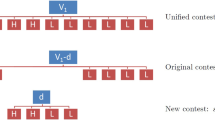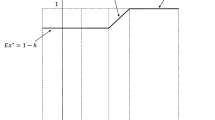Abstract
We analyze the problem of choosing the w contestants who will win a competition within a group of n > w competitors when all jurors commonly observe who the w best contestants are, but they may be biased. We study conditions on the configuration of the jury so that it is possible to induce the jurors to always choose the best contestants, whoever they are. If the equilibrium concept is dominant strategies, the condition is very strong: there must be at least one juror who is totally impartial, and the planner must have some information about who this juror is. If the equilibrium concept is Nash (or subgame perfect) equilibria the condition is less demanding: for each pair of contestants, the planner must know that there is a number of jurors who are not biased in favor/against any of them and he must have some information about who these jurors are. Furthermore, the latter condition is also necessary for any other equilibrium concept.
Similar content being viewed by others
References
Abreu D, Sen A (1990) Subgame perfect implementation: a necessary and sufficient condition. J Econ Theory 50: 285–299
Amorós P (2009) Eliciting socially optimal rankings from unfair jurors. J Econ Theory 144: 1211–1226
Amorós P (2011) A natural mechanism to choose the deserving winner when the jury is made up of all contestants. Econ Lett 110: 241–244
Amorós P, Corchón LC, Moreno B (2002) The scholarship assignment problem. Games Econ Behav 38: 1–18
Austen-Smith D (1993) Interested experts and policy advice: multiple referrals under open rule. Games Econ Behav 5: 3–43
Austen-Smith D, Banks JS (1996) Information aggregation, rationality and the Condorcet jury theorem. Am Political Sci Rev 90: 34–45
Danilov V (1992) Implementation via Nash equilibria. Econometrica 60: 43–56
Duggan J, Martinelli C (2001) A Bayesian model of voting in juries. Games Econ Behav 37: 259–294
Feddersen T, Pesendorfer W (1996) The swing voter’s curse. Am Econ Rev 86: 408–424
Feddersen T, Pesendorfer W (1997) Voting behavior and information aggregation in elections with private information. Econometrica 65: 1029–1058
Gerardi D, McLean R, Postlewaite A (2009) Aggregation of expert opinions. Games Econ Behav 65: 339–371
Gibbard A (1973) Manipulation of voting schemes: a general result. Econometrica 41: 587–601
Jackson MO (1992) Implementation in undominated strategies: a look at bounded mechanisms. Rev Econ Stud 59: 757–775
Krishna V, Morgan J (2001) Assymetric information and legislative rules: some amendments. Am Political Sci Rev 95: 435–452
Martinelli C (2002) Convergence results for unanimous voting. J Econ Theory 105: 278–297
Maskin E (1999) Nash equilibrium and welfare optimality. Rev Econ Stud 66: 23–38
Moore J, Repullo R (1988) Subgame perfect implementation. Econometrica 56: 1191–1220
Repullo R (1987) A simple proof of Maskin theorem on Nash implementation. Soc Choice Welf 4: 39–41
Saijo T (1988) Strategy space reduction in Maskin’s theorem: sufficient conditions for Nash implementation. Econometrica 56: 693–700
Serrano R (2004) The theory of implementation of social choice rules. SIAM Rev 46: 377–414
Wolinsky A (2002) Eliciting information from multiple experts. Games Econ Behav 41: 141–160
Yamato T (1992) On Nash implementation of social choice correspondences. Games Econ Behav 4: 484–492
Author information
Authors and Affiliations
Corresponding author
Rights and permissions
About this article
Cite this article
Amorós, P. Picking the winners. Int J Game Theory 42, 845–865 (2013). https://doi.org/10.1007/s00182-012-0332-z
Accepted:
Published:
Issue Date:
DOI: https://doi.org/10.1007/s00182-012-0332-z




